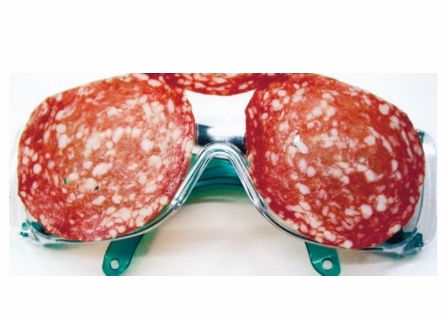
WTI Magazine #82 2016 August 19
Author : Giulia Casati for the Italian School NJ Translation by:
One thing everyone knows about Italians is that they love their food. They love their bread, their pasta, their pizza, and nothing else is like a good lasagna made by their grandma. Salami, focaccia, gelato, hey, anything Italian is delicious. What most people don't know is that the love of food doesn't end at the table, in fact, Italians have tons of food references within their spoken expressions.
For example, have you ever had salami slices on your eyes? Or been hit in the face with fish? Have you ever given the impression of being a chocolate maker? I bet not. But, if you ask to your average Italian, I assure you they have.
Many of the most unique Italian expressions are, in fact, based on food. "Sei buono come il pane," you are as good as bred, "render pan per focaccia," give bread for focaccia, "dire pane al pane e vino al vino," tell bread to the bread and wine to the wine. Do these make any sense to you? Don't worry, it's not supposed to make sense if you're not Italian.
Food is such an important part of Italian culture that it really becomes a term of comparison for everyday life events. But what do they really mean? Here are some examples.
"Hai le fette di salame sugli occhi," to have salami slices on your eyes means that you can't see the most obvious thing; "Essere preso a pesci in faccia," to be hit in the face with fish means that someone is treating you very badly, just like it would be if someone was actually hitting you with a dead, smelly fish. Pretty rude, huh?
"Sono alla frutta," to be at the fruit, or at the last course of a long Italian feast (finally), which means that you've had enough, you're fed up, and done; "avere il sale in zucca," to have salt on your pumpkin, which means that you're smart, because you have something that head of yours; and "tutto fumo e niente arrosto," it's all smoke and no roastbeef, which means that someone is all appearance and no substance ... just like my ex-boyfriend.
Lastly, my absolute favorite "non puoi avere la botte piena e la moglie ubriaca," you can't have the barrel full and the wife drunk too (unfortunately), which means that you can't have everything, you have to give something up. So much food for just a conversation.
Historically, Italy has always been a divided country made up by so many different populations, languages, and traditions. But there is one thing that has always brought everyone together: food. Food has always been a common denominator, a mediator that brought all kinds of people together, no matter what their differences were and are. For this reason, Italians are so proud and attached to their food, not only because it is one of the best cuisine in the world, but also for the importance it has in creating a united Italian identity. Therefore, in Italy there has been a marriage between food and communication, in order to bring people together and help them understand each other.
And with that said, sono alla frutta! Buon Appetito!



